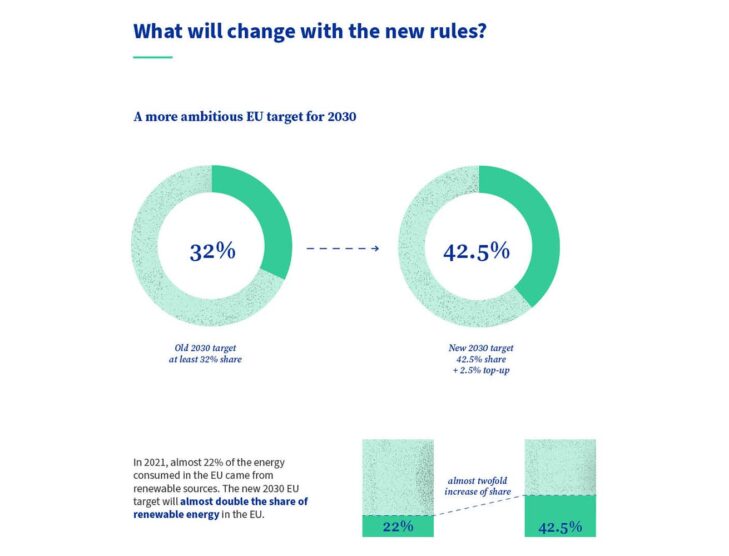
EU sets ambitious renewable energy targets
The European Union (EU) is taking significant strides in its commitment to combat climate change. The European Council recently adopted new regulations aimed at increasing the use of renewable energy across member states. The ambitious plan outlines a target to ensure that 42.5% of the energy consumed within the EU is sourced from renewable means by 2030. An additional 2.5% indicative top-up is also in consideration.
All member states will contribute to achieving more ambitious sector-specific targets in transport, industry, buildings and district heating and cooling. The purpose of the sub-targets is to speed up the integration of renewables in sectors where incorporation has been slower.
“This is a great achievement in the framework of the ´Fit for 55´package which will help to achieve the EU’s climate goal of reducing EU emissions by at least 55% by 2030. It is a step forward which will contribute to reaching the EU´s climate targets in a fair, cost-effective and competitive way,” said Teresa Ribera, Spanish acting Minister for the Ecological Transition.
The directive has been formally adopted. It will now be published in the EU’s Official Journal and enter into force 20 days later. Member states will have 18 months after the entry into force of the directive to transpose it into national legislation.
Member states will have the possibility to choose between:
- a binding target of a 14.5% reduction in greenhouse gas intensity in transport from the use of renewables by 2030
- or a binding share of at least 29% of renewables within the final consumption of energy in the transport sector by 2030
The new rules establish a binding combined sub-target of 5.5% for advanced biofuels (generally derived from non-food-based feedstocks) and renewable fuels of non-biological origin (mostly renewable hydrogen and hydrogen-based synthetic fuels) in the share of renewable energies supplied to the transport sector. Within this target, there is a minimum requirement of 1% of renewable fuels of non-biological origin (RFNBOs) in the share of renewable energies supplied to the transport sector in 2030.
A closer look
The Council’s decision underscores the EU’s commitment to a greener future, aligning with global efforts to mitigate the impacts of climate change. The new rules are not just numerical targets but are part of a comprehensive strategy to reduce greenhouse gas emissions, promote sustainable energy, and ensure energy security for all member states.
The 42.5% target is a significant increase, marking the EU’s determination to be at the forefront of the global green energy transition. The rules are comprehensive, covering various sectors and aiming to create a balanced approach that considers economic, social, and environmental factors.









